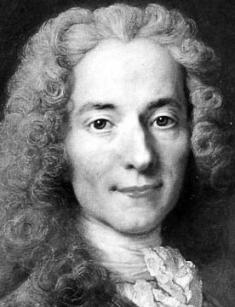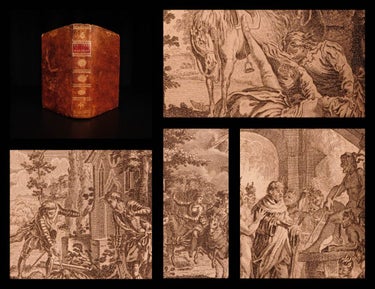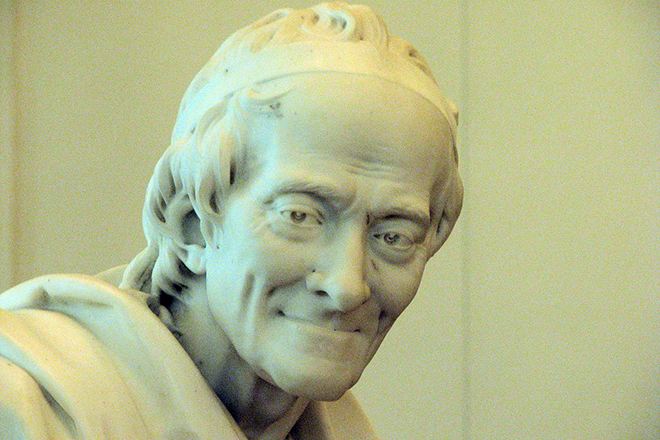
Voltaire: biography
Two astronomers said to Voltaire that he would live to 33. But the great thinker managed to deceive death itself; he miraculously survived because of a failed duel with a certain nobleman from the de Rohan family. The biography of the French philosopher is full of both ups and downs, but his name became immortal.
Voltaire, who went to England as a writer and returned as a wise man, made an undeniable contribution to a particular form of knowledge of the world, his name is on a par with Denis Diderot and Jean-Jacques Rousseau. The writer, in whose veins there was not a drop of noble blood, was favored by the great rulers - the Russian Empress Catherine II, the king of Prussia, Frederick the Great, and the bearer of the Swiss crown Gustav III.
For the upcoming generations, the thinker left stories, poems, tragedies, and his books Candide, or Optimism, and Zadig, or, Destiny went to quotes and catchphrases.
Childhood and youth
François-Marie Arouet (philosopher's birth name) was born on November 21, 1694, in the city of love, Paris. The baby was so frail and weak that immediately after his birth, the parents sent for the priest. Unfortunately, Marie Marguerite Daumard, Voltaire's mother, died when the boy was seven years old. Therefore, the future writer of the thoughts of Western Europe grew up and was brought up with his father, who was in the official service.

Little Voltaire did not have a close relationship with his father, so it is no surprise that in adulthood, Arouet declared himself the illegitimate offspring of the Guérin de Rochebrune, a poor poet and musketeer. François Arouet senior sent his child to the Jesuit College, which now bears the name of The Lycée Louis-le-Grand.
In this college, Voltaire studied "Latin and all sorts of nonsense," because the young man, although he received a serious literary training for the rest of his life, hated the fanaticism of the local Jesuit fathers, who put religious dogmas above human life.

Voltaire's father wanted his son to follow in his footsteps and become a notary, so François-Marie was quickly put into a law office. Soon the young man understood that law, so favored by the ancient Greek goddess Themis, was not the thing he was particularly interested in. So, to escape the boredom that caught him during his studies, Voltaire took up the inkwell and pen, and instead of putting down the essence of documents, he started writing satirical stories.
Literature
When Voltaire was 18 years old, he wrote his first play and even then did not doubt that he would leave a mark in history as a writer. Two years later, François-Marie Arouet had already won the fame of the king of satire both in the Parisian salons and among sophisticated ladies and gentlemen. Therefore, some literary figures and dignitaries were afraid to find the publication of Voltaire, exposing them to society in a bad light.

But in 1717, François-Marie Arouet had to pay for his witty stories. The thing is that the talented young man mocked the Regent of the French Kingdom under the infant King Louis XV-Philippe II, Duke of Orléans. But the governor did not treat Voltaire's poems with proper humor, so the writer was sent to the Bastille for a year.
But in prison, Voltaire did not lose his creative zeal, but on the contrary, he began to study literature hard. After being released, Voltaire quickly gained back his popularity thanks to his tragedy Oedipus which was staged on the Comédie-Française, a French state theater.

The young man began to be compared with the famous French playwrights, so Voltaire, who believed in his own literary talent, composed one work after another, and these were not only philosophical tragedies but also novels and pamphlets. The writer relied on historical images, so on the stage, theater patrons could see actors dressed as Caesar, Brutus, or Muhammad.
In total, the track record of François-Marie Arouet includes 28 works that can be attributed to the classic tragedy. Voltaire also cultivated aristocratic genres of poetry, from his pen often came messages, gallant lyrics, and odes. But it is worth saying that the writer was not afraid to experiment and mix seemingly incompatible things (tragedy and comedy) in one bottle.
He was not afraid to dilute rational coldness with notes of sensibility, and his classical works often featured exotic characters: Chinese, Iranian-speaking Scythians, and Zoroastrian coats of arms.
As for poetry, Voltaire's classic epic La Henriade was published in 1728. In this work, the great Frenchman condemned the despotic kings for their violent worship of God, using not fictional images, but real prototypes. Further, around 1730, Voltaire was working on the fundamental satirical parody poem The Maid of Orleans. But the book itself was first printed only in 1762, before that, the part of it came out in anonymous editions.

Voltaire's The Maid of Orleans, written in syllabic verse, plunges the reader into the story of a real person, the well-known national heroine of France, Joan of Arc. But the work of the writer is not a biography of the commander of troops, but a continuous mockery of the system of French society and the Church.
It is worth noting that Alexander Pushkin was very fond of this manuscript, the Russian poet even sought to imitate Voltaire in his poem Ruslan and Ludmila (but, growing up, Pushkin addressed a very critical work to the "French mentor" ).

Among other things, François-Marie Arouet distinguished himself from others by writing philosophical prose, which gained unprecedented popularity among his contemporaries. The author not only plunged the reader of his books into adventure stories but also made one think about the futility of being, the power of a person, as well as the senselessness of pure Optimism and the absurdity of ideal pessimism.
The work The Huron (L'Ingénu), published in 1767, focuses on the misadventures of an adherent of the "theory of natural law." This manuscript is a mixture of lyrical elements, an educational book, and a philosophical story.
The plot revolves around a typical character-a noble savage, a kind of Robinson Crusoe of the Enlightenment, which illustrates the innate morality of man before his contact with civilization. But it is also worth paying attention to Voltaire's novella Candide, ou l'Optimisme (Candide, or Optimism, 1759), which instantly became a world bestseller.
For a long time, this work could not see the light of day because it was banned due to obscenity. It is interesting that the writer of Candide or Optimism considered this novel a folly and even refused to recognize his authorship. Candide or Optimism is somewhat reminiscent of a typical adventurous book, a genre that has developed in Spain. As a rule, the main character of such a work is an adventurer who makes the reader sympathize with him.

But Voltaire's most quoted book is endowed with absurdity and angry sarcasm: all adventures of the characters are thought up to mock the society, the government, and the Church. In particular, the Saxon philosopher Gottfried Leibniz, who promoted the doctrine described in the Theodicy, or Justification of God, fell into disgrace.
The Roman Catholic Church blacklisted this book, but this did not prevent Candide, or Optimism from gaining admirers in the person of Alexander Pushkin, Gustave Flaubert, Fyodor Dostoevsky, and the American composer Leonard Bernstein.
Philosophy
Voltaire ended up among the cold walls of the Bastille once again. In 1725-1726 there was a conflict between the writer and the Guy Auguste de Rohan-Chabot: the nobleman allowed himself to publicly offend François-Marie Arouet, who, according to him, tried to hide his non-noble origin under a pseudonym. As the author of tragedies was never at a loss for words, he quickly answered the offender:
"Sir, glory awaits my name, and oblivion - yours."
For these offensive words the Frenchman paid in the literal sense, he was beaten by de Rohan's bellboy. Thus, the writer felt firsthand what bias meant, became an ardent advocate of justice and social reforms. Coming out of the exclusion zone, obsolete in his homeland, Voltaire, by order of the king, was exiled to England.
It is noteworthy that the state structure of the United Kingdom, which was fundamentally different from conservative monarchical France, struck him to the tips of his fingers. It was also useful to get acquainted with the English thinkers, who unanimously argued that a person could turn to God without resorting to the help of the Church.

French thinker expressed his impressions from the trip to the island state, in the treatise Philosophical Letters, promoting in it the teachings of John Locke and denying materialistic philosophy. The main ideas of the Philosophical Letters were equality, respect for property, security, and freedom. Voltaire was also in two minds about the immortality of the soul; he did not deny but did not assert the fact that there was life after death.
But when it came to the freedom of the human will, Voltaire passed from indeterminism to determinism. Louis XV, having learned about the treatise, ordered to burn the work of Voltaire, and the author of the work was sent to the Bastille. To avoid the third imprisonment in the cell, François-Marie Arouet went to Champagne, to his beloved.

Voltaire, a supporter of equality who denied absolutism, criticized the Church system, but he did not support atheism. The Frenchman was a deist, that is, he acknowledged the existence of the Creator, but denied religious dogmatism and supernatural phenomena. But in the 60-s and the 70-s, Voltaire became somewhat skeptical about everything. When contemporaries asked the educator whether there was a "higher power," he replied:
"There is no God, but my footman and wife must not know this, for I do not want my footman to kill me, and my wife to stop obeying me."
Although Voltaire, contrary to his father's wishes, never became a lawyer, in the future, the philosopher was engaged in human rights activities. In 1762, the author of Candide, or Optimism, participated in a petition to abolish the death sentence of the merchant Jean Calas, who was the victim of a biased court because of a different confession. Calas represented Christian xenophobia in France: he was a Protestant, while others professed Catholicism.

The reason Jean was executed in 1762 by breaking on the wheel was the suicide of his son. At that time, a man who took his own life was considered a criminal, and his body was publicly dragged on ropes and hung in the square. Therefore, the Calas family presented the suicide of the offspring as murder, and the court considered that Jean had killed the young man because he had converted to Catholicism. Thanks to Voltaire, three years later, Jean Calas was redeemed.
Personal life
In his spare time from writing treatises and philosophical thoughts, Voltaire played chess. For 17 years, the Frenchman's rival was the Jesuit father Adam, who lived in the house of François-Marie Arouet.
Émilie du Châtelet was Voltaire's beloved, as well as his muse and inspiration. She was passionate about mathematics and physics. This young lady even happened to translate the fundamental work of Isaac Newton in 1745.
Émilie was a married woman, but she thought that all the commitment of a wife to a man must occur only after the birth of children. Therefore, the young lady, without breaking the bounds of decency, plunged into fleeting affairs with mathematicians and philosophers.
The beauty met Voltaire in 1733, and in 1734 provided refuge from re-imprisonment in the Bastille, a half-ruined castle of her spouse, in which the philosopher spent 15 years of his life, coming there from numerous trips.

Émilie du Châtelet instilled a love for equations, the laws of physics, and mathematical formulas in Voltaire, so the lovers often solved complex mathematical problems. In the autumn of 1749, Émilie died after giving birth to a child, and Voltaire, who had lost the love of his life, sank into depression.
By the way, few people know that Voltaire was a millionaire. In his youth, the philosopher met with bankers who taught Voltaire to invest his capital. Rich by the age of forty, the writer invested in the equipment of the French army, gave money to buy ships and bought works of art, and his estate in Switzerland included pottery manufacture.
Death
In the last years of his life, Voltaire was popular; every contemporary considered it his duty to visit the Swiss house of the wise older man. The philosopher hid from the French kings, but with the help of persuasion returned to the country of Paul Cézanne, where he died at the age of 83.

The remains of the author of intricate statements and views were buried in the tomb in the Pantheon (Paris).
Bibliography
- 1730 – King Charles XII of Sweden
- 1732 – Zaïre
- 1734 – Letters on the English
- 1738 – Micromégas
- 1738 – The Elements of Sir Isaac Newton's Philosophy
- 1748 – Sémiramis
- 1756 – Essay on Universal History, the Manners, and Spirit of Nations
- 1757 – Zadig, or, Destiny
- 1758 – Candide, or Optimism
- 1759 – Socrates
- 1760 – Tancrède
- 1763 – Traité sur la tolérance
- 1765 – Idées républicaines
- 1771 – The Huron, or Pupil of Nature
- 1774 – Don Pèdre, roi de Castille
- 1774 – Sophonisbe
- 1779 – Agathocle
Quotes
"To believe in God is impossible not to believe in Him is absurd."
"Our wretched species is so made that those who walk on the well-trodden path always throw stones at those who are showing a new road."
"Common sense is not so common."
"The mirror is a worthless invention. The only way to truly see yourself is in the reflection of someone else’s eyes."
"The more often a stupidity is repeated, the more it gets the appearance of wisdom."




